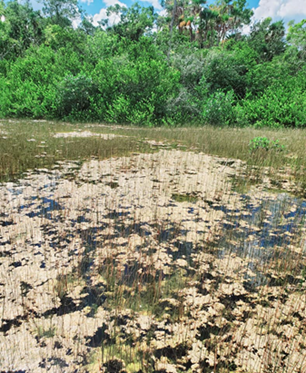Along with its diverse wildlife and habitats, the Florida Everglades is also home to periphyton: a unique collection of organisms made up of algae, cyanobacteria, and microbes that attach to plants or other surfaces in the wetland. Periphyton is an important component of the Everglades, as it forms floating mats in the water that shield plants and other organisms from the intense sun. Periphyton also plays a key role in the production of soluble or dissolved organic matter (DOM). When organic materials decompose, DOM can form through a combination of plants, soil, bacteria, algae, and other living organisms. The Everglades is rich in DOM thanks largely to the vast amounts of periphyton. This wealth of DOM can influence environmental factors such as the transport, absorption, and cycling of chemicals and toxic metals like mercury. In freshwater bodies like much of the Everglades, mercury can naturally convert to methylmercury, which transfers more easily throughout the food web and bio-accumulates in organisms such as fish, posing health risks to whoever eats them. Because of this, environmental agencies have cautioned against eating too much fish that come from potentially affected waters.

Afia Anjuman, a PhD fellow at the NSF CREST Center for Aquatic Chemistry and Environment, is exploring the complex relationship between mercury, periphyton, and Everglades DOM at a molecular level. Anjuman has performed a series of quantitative and qualitative analyses on floating mats of periphyton and their surrounding waters, to compare interactions with DOM and mercury. Her results have provided information on the nutrient and chlorophyll-a contents of these waters, as well as how mercury concentrations can affect the periphyton DOM. The data on these floating periphyton mats can be useful in “fingerprinting” certain parts in the Everglades for their unique biochemical characteristics. Anjuman’s study will help advance general knowledge on the natural cycles of mercury, a widespread pollutant of global concern.
The NSF CREST Center for Aquatic Chemistry and Environment is housed within the Institute of Environment, a Preeminent Program at Florida International University.
